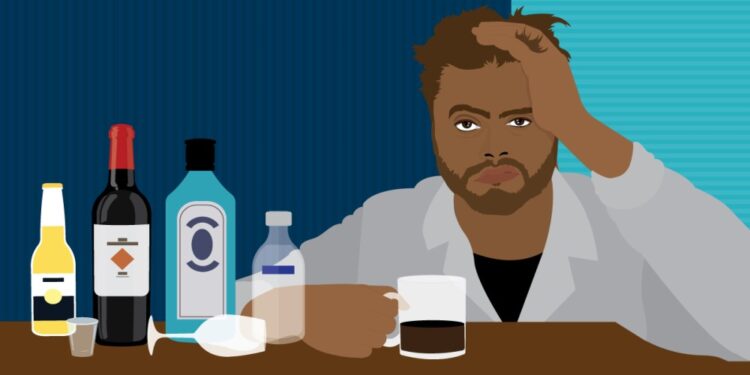A hangover is a group of unpleasant signs and symptoms that can develop after drinking too much alcohol. The effects of a hangover can be different from person to person, but these heavy hitting symptoms remain similar (dehydration, fatigue, depression, upset stomach, and just general lousiness). All these symptoms are a result of several processes that happen in the body when you hit the bottle a little too hard. Let’s start with the breakdown of alcohol in your liver.
When alcohol passes through your liver, two enzymes help metabolize it, or break it down into simpler parts; alcohol dehydrogenase (ADH) and aldehyde dehydrogenase (ALDH). ADH converts alcohol to acetaldehyde, a known toxin and carcinogen. ALDH then converts this compound into acetate, which is further broken down into carbon dioxide and water. Some research suggests that high acetaldehyde levels can lead to cognitive impairment, memory loss, dry mouth, tiredness, amongst other run down feelings.
Here are some tips on how prevent a hangover.
1. Avoid drinks high in congeners
Congeners are toxic chemicals that include methanol, isopentanol and acetone. Alcoholic drinks with high levels of congeners seem to increase the frequency and intensity of hangovers. It is believed that the darker liquor is the biggest hangover culprit it is due to the presence of congeners (a substance that is found in alcohol that supposedly causes headaches). Drinks high in congeners include whiskey, cognac and tequila. Colourless drinks – like vodka, gin and rum – have low levels of congeners, therefore have a lower rate of hangover activation.
2. Drink plenty of water
Alcohol has the ability to inhibit the production of a hormone called vasopressin, which regulates how much water your kidneys hold. When vasopressin is limited, it causes your kidneys to dump their water reserves into your bladder. For this reason, alcohol is called a diuretic , and can cause your body to feel quite miserable the next day. The more water in your system, the less of a chance of significant dehydration.
3. Get enough sleep
Rarely do you wake up dehydrated without waking up feeling like you haven’t slept enough. Over consumption of alcohol does a number on the sleep department of your brain. Alcohol is known to mess with these two neurotransmitters (GABA and glutamate), which both play a significant role sleep and wakefulness. GABA is an inhibitory neurotransmitter, which means it stops neurons from working too much and interferes with neural processes in the central nervous system. Alcohol enhances GABA’s activity in receptors, ultimately turning up the effects on the central nervous system.
Glutamate on the other hand is an excitatory neurotransmitter that ramps up neural activity. Alcohol can make receptors take fewer commands from glutamate, further winding down neural activity. Despite these depressant effects that make you want to sleep, overconsumption of alcohol means less time in dreamy REM (Rapid Eye Movement) sleep, which means your engine doesn’t get replenished for the next day. So in other words falling asleep drunk is never really going to give you a full night’s sleep, whether or not you sleep longer than usual.
4. Eat heavy before drinking
To help alleviate the issue of a weakened stomach lining, it’s wise to make sure you have some heavy foods in your stomach before you begin drinking. This goes double for proteins, which slow down the absorption of alcohol into your blood. Don’t drink on an empty stomach, unless you want a troubled stomach.
5. Avoid the sweet stuff
Mixed drinks such as cocktails are loaded with sugar and alcohol. Due to the sweetness, one ends up drinking more alcohol than intended. Thus raising the chances of a near murderous hangover. It is also believed that sugar makes the alcohol ‘hit harder’.
6. Avoid carbonated drinks
Soft drinks and other carbonated drinks speed up the alcohol absorption and the more alcohol you have in your bloodstream, the deadlier the hangover. Substitute the carbonated drinks with fruit juices.
7. Don’t drink anything at least an hour and half before bed
Instead of waking up to pee and interrupting your already messed up sleep cycle, prepare yourself ahead of time so you can get the most of it how little your drunken sleep has to offer you. Some folks out there get hit pretty hard the next day with nausea, diarrhea, and vomiting. Well it’s of no surprise. Alcohol can mess with the mucus lining of your stomach, which protects your guts from the acidic contents held within.
8. Have a drink the morning after
Drinking more alcohol is believed to affect the metabolism of methanol, a well-known congener found in trace amounts in some drinks. After drinking, your body converts methanol into formaldehyde, a highly toxic substance. Formaldehyde may be partly responsible for many hangover symptoms. However, consuming alcohol the morning after drinking heavily can inhibit this conversion process, preventing formaldehyde from forming. Instead, methanol is discharged harmlessly from your body via your breath and urine. That said, having another drink in the morning is strongly discouraged as a hangover remedy – as it may put your health on risk.
9. Crush some eggs when you wake up
Eggs have a high concentration of an amino acid called L-cysteine which helps your body more rapidly break down excess acetaldehyde, and in turn eliminates some of your hangover symptoms. Arguably one of the worst symptoms of a hangover is dehydration because causes exhaustion, dizziness, headaches, amongst most other disappointing sensations.
Bottom line
The severity of hangovers increases with the amount of alcohol you consume. For this reason, the best way to prevent hangovers is to drink in moderation – or abstain completely. The more alcohol you drink, the more likely you are to have a hangover the next day. The amount of alcohol needed to produce a hangover varies among individuals. There’s no magic formula to tell you how much you can safely drink and still avoid a hangover. However unpleasant, most hangovers go away on their own, though they can last up to 24 hours.


































































































































































































